Key takeaways:
- Town hall meetings are vital for civic engagement, allowing citizens to voice concerns and influence local policies.
- Personal stories shared at these meetings humanize political issues and can lead to meaningful discussions and policy changes.
- Effective participation requires preparation, clarity in communication, and active listening to foster a collaborative environment.
- The future of town hall meetings includes enhanced technology, enabling greater inclusivity and transparency in community discussions.
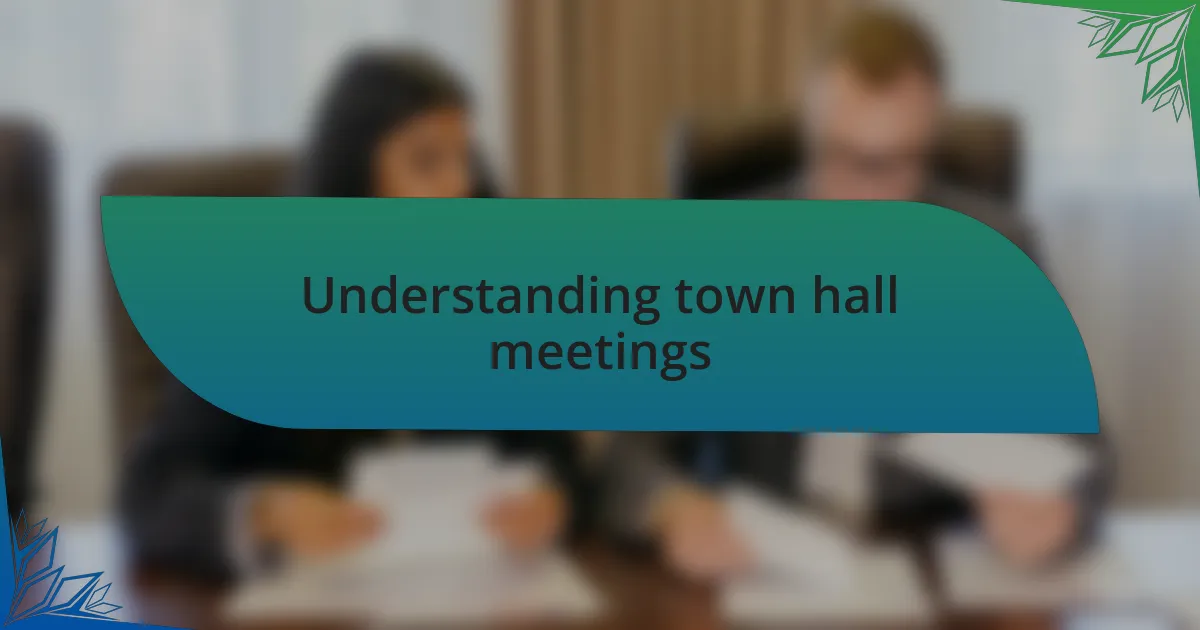
Understanding town hall meetings
Town hall meetings are unique platforms for community dialogue that allow citizens to engage directly with their elected officials. I remember attending my first meeting, filled with excitement and a bit of nervousness. The raw energy in the room was palpable, as residents voiced their concerns about local issues, helping me understand just how important these gatherings are for civic engagement.
These meetings aren’t just about politics; they’re about people and their stories. One elderly gentleman stood up to share how a proposed development would impact his family home, and I couldn’t help but feel a deep connection to his plight. Isn’t it fascinating how a single story can humanize complex political decisions?
Understanding the dynamics of town hall meetings means recognizing both their potential and limitations. While they serve as a space for grassroots activism, it’s also crucial to ask how diverse voices are represented. Have you ever wondered if everyone feels empowered to speak up? From my experience, ensuring all community members feel welcome can turn these meetings into a powerful force for change.
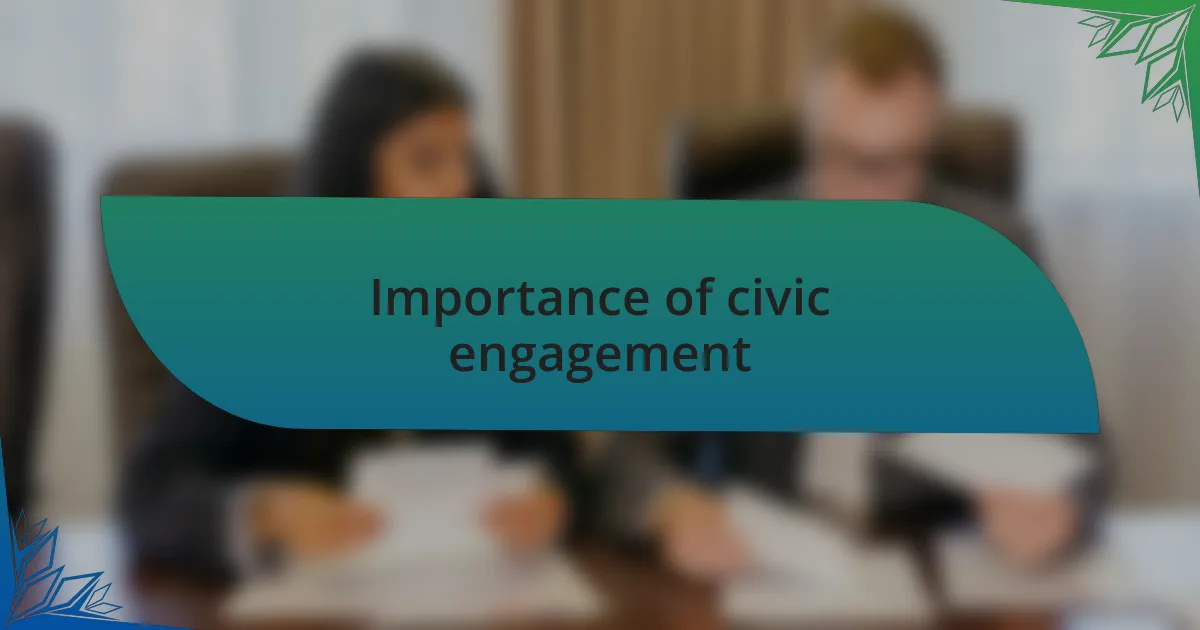
Importance of civic engagement
Civic engagement is the backbone of a healthy democracy. When citizens take an active role in their communities, they contribute to the collective decision-making process that shapes local policies. I recall a moment during a meeting when a single mother expressed her struggles to access affordable childcare. It struck me how crucial it is for each of us to share our stories; they illuminate the true impact of legislation on everyday lives. Have you ever thought about how your own experiences could inspire change?
Attending town hall meetings also fosters accountability among elected officials. I vividly remember when a city council member was challenged on a decision that affected public transportation. The urgency in the voices of those affected was undeniable. This kind of engagement holds leaders responsible and reinforces the idea that they must listen to the constituents they serve.
Moreover, civic engagement cultivates a sense of community. It can be incredibly uplifting to see a diverse group of people united by a common goal. I once participated in a session where residents collaborated on a neighborhood beautification project. The camaraderie that developed during that discussion was palpable. It made me realize that being involved isn’t just about advocating for issues; it’s also about building relationships that strengthen our communities. Have you felt that sense of belonging when discussing shared aspirations with others?
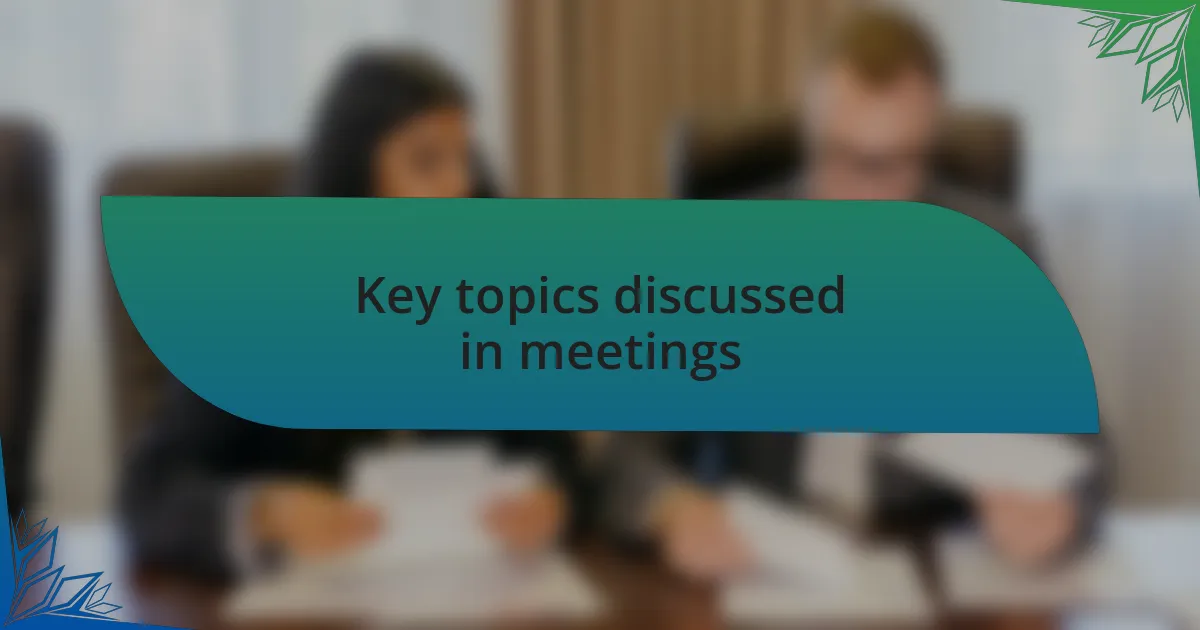
Key topics discussed in meetings
At town hall meetings, a range of pressing local issues often arises, reflecting the diverse concerns of the community. For instance, during one meeting, there was an intense discussion about affordable housing. I remember the palpable tension in the room as residents shared their fears of being priced out of their neighborhoods. It made me wonder: how does the fight for housing impact not just individuals, but the character of an entire community?
Another recurring topic is public safety, which frequently leads to heated debates. I once sat next to a resident who passionately expressed her worries over rising crime rates, sharing a personal story that resonated with many in the audience. It struck me how personal experiences like hers can ignite discussions that lead to tangible policy changes. Have you ever considered how safety issues touch our daily lives and shape our sense of belonging?
Moreover, environmental concerns often take center stage at these gatherings. I found it fascinating when a local activist presented findings on the effects of pollution in our area, urging us to think critically about our role in advocating for cleaner air. That night, I felt a shared responsibility; it was a moment where the urgency of our environmental choices became undeniable. How often do we connect our daily habits to the broader environmental impact?
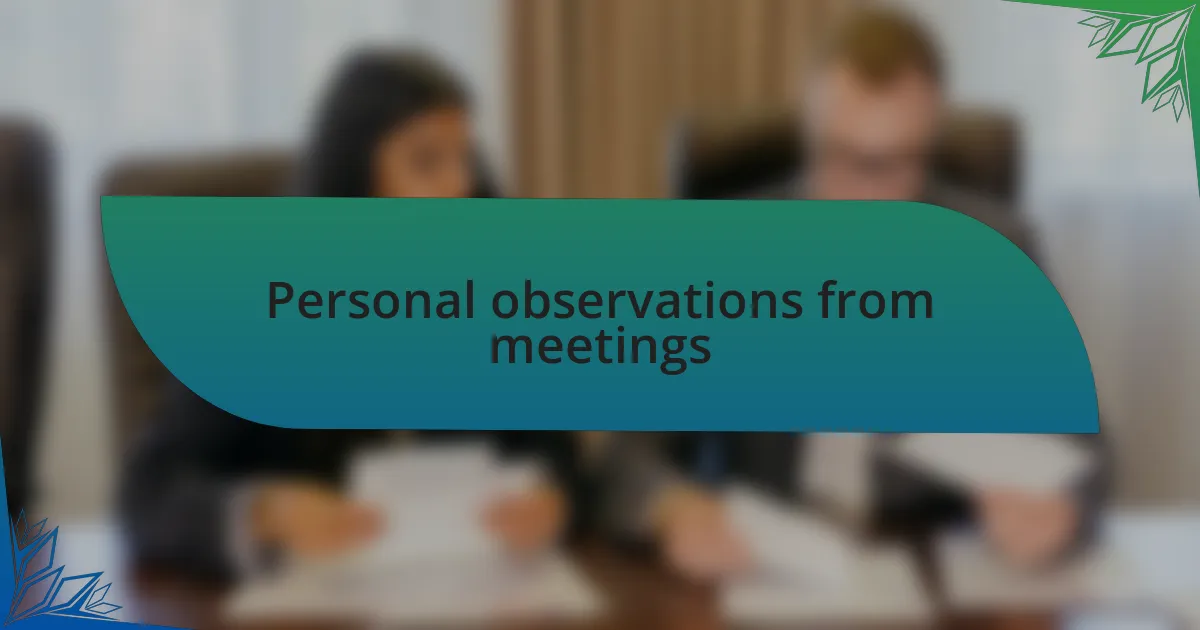
Personal observations from meetings
At these meetings, I’ve noticed a unique sense of camaraderie among community members. One evening, when a veteran spoke about the need for better mental health services for returning soldiers, the room fell silent. It was a powerful reminder of how shared experiences can unite us and push us to address vital issues. Have you ever witnessed how a single story can change the atmosphere in a room?
Another observation I’ve made is the dynamic nature of opinions. During a discussion about school funding, I watched as a young parent and a long-time resident exchanged viewpoints. Their exchange was both enlightening and challenging, illustrating that diverse perspectives can drive richer conversations. It sparked something in me: how often do we allow ourselves to listen and learn from those whose backgrounds differ from our own?
I also realized how influential body language can be during these gatherings. When community leaders spoke passionately about infrastructure improvements, the audience leaned in, nodding and showing their support. But, conversely, moments of skepticism arose when proposals lacked clarity or detail. It made me think: how much does nonverbal communication shape our trust and engagement in public discussion?
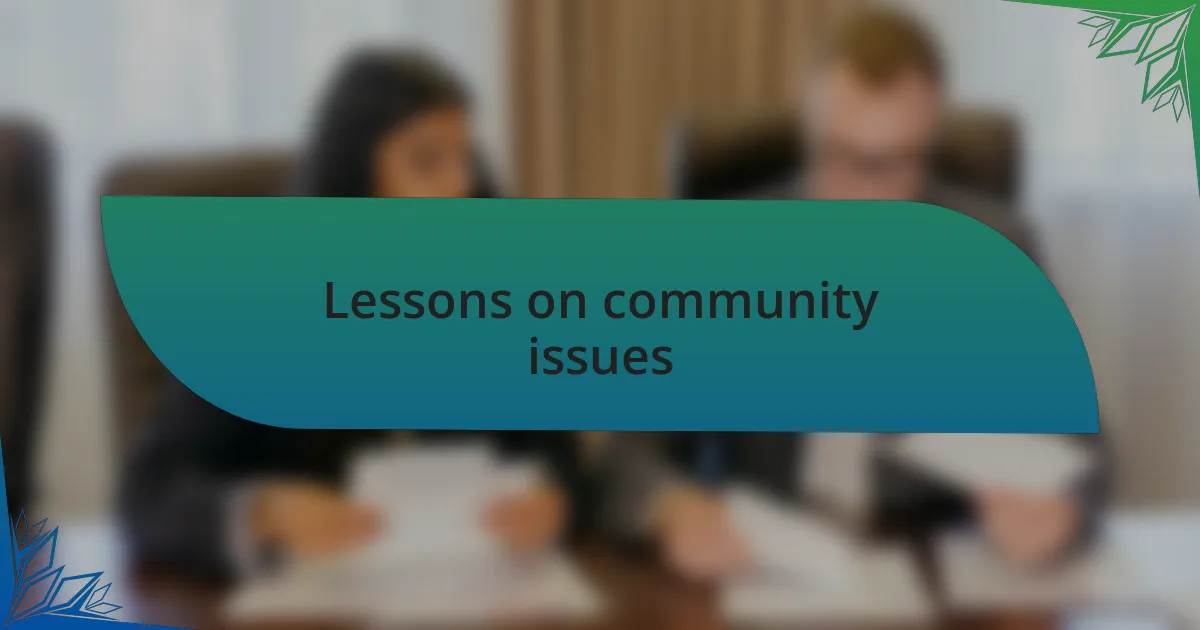
Lessons on community issues
Attending town hall meetings has highlighted the stark reality of community issues that often go unnoticed. For instance, during a debate on local housing initiatives, I noticed a poignant moment when a single mother shared her struggles with affordable housing. Her vulnerability struck a chord with many, reminding me of the real, human impact behind statistics. How often do we overlook the individual stories that make up the broader data?
Another lesson I’ve learned revolves around the power of engagement. At one meeting, a passionate resident challenged the proposed traffic changes in our neighborhood. They weren’t just another voice; they represented the frustrations of countless others who felt unheard. It got me thinking: why do we sometimes shy away from voicing our concerns? Engaging in these discussions can be a catalyst for change, underscoring the importance of speaking up for our community’s needs.
Lastly, I’ve become acutely aware of the importance of follow-up on community issues. After a discussion on environmental concerns, I sought out more information and discovered that many proposals require ongoing feedback from residents to be effective. This realization made me question: how often do we circle back to these issues, ensuring they stay on our local leaders’ radar? Consistent engagement is vital; it reinforces that community voices matter and can lead to tangible outcomes.
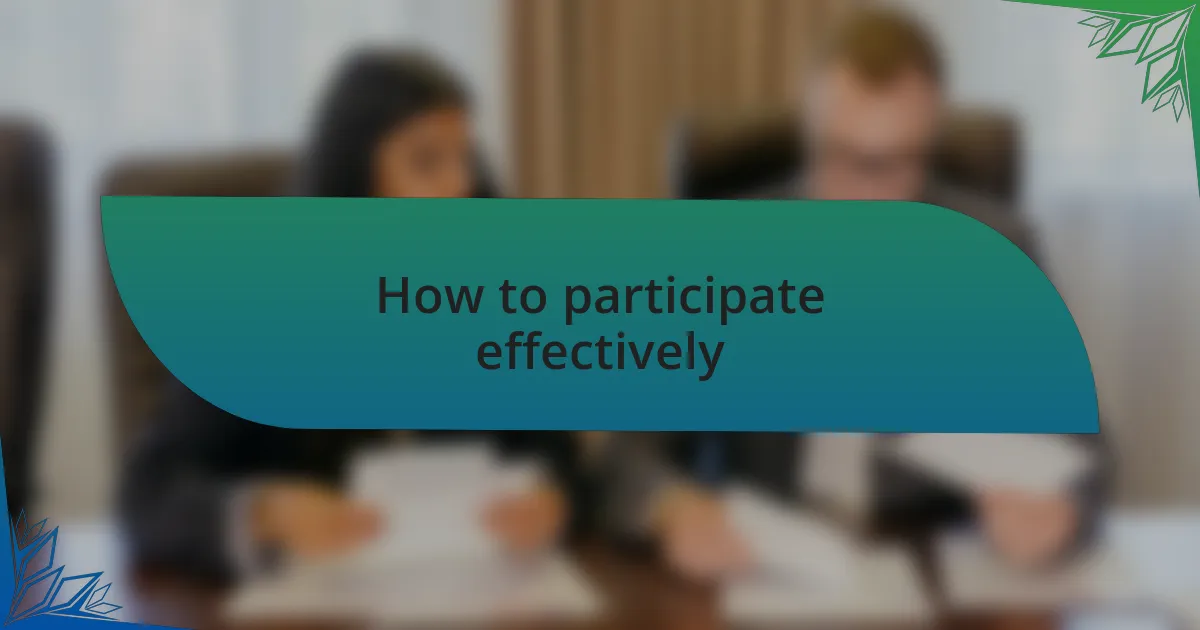
How to participate effectively
Participating effectively in town hall meetings starts with preparation. Before attending, I always take some time to research the agenda and the key issues being discussed. This not only helps me to formulate insightful questions but also gives me the confidence to engage meaningfully with the topics at hand. Have you ever heard a discussion and felt completely unprepared? That could be avoided with just a bit of knowledge beforehand.
When I find myself at the microphone, I aim to be clear and concise. I remember one meeting where I was nervous about sharing my opinion on a proposed zoning change. Instead of rambling, I focused on stating my concerns directly and simply. This approach not only kept my fellow attendees engaged but also made it easier for local leaders to grasp my points. It’s fascinating how clarity in communication can amplify our voices.
Active listening is another critical component of effective participation. Once, during a particularly heated debate on community funding, I realized the importance of truly absorbing opposing viewpoints before responding. Instead of forming my counter-argument in my head, I listened intently and reflected on different perspectives. This openness not only enriches the conversation but also fosters a collaborative atmosphere where solutions can be born. How often do we genuinely pause to listen, rather than just waiting for our turn to speak?
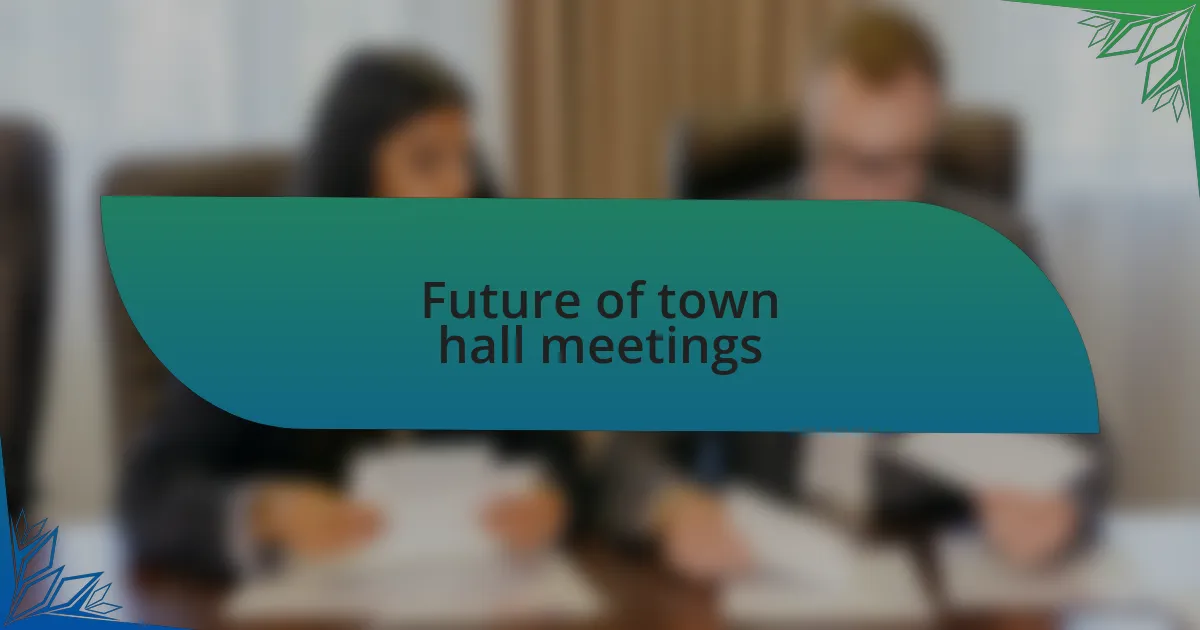
Future of town hall meetings
The future of town hall meetings seems promising as technology continues to reshape how we engage in civic discussions. I once attended a virtual town hall where participants joined from various locations, creating a diverse dialogue unlike any I’d experienced before. It made me wonder: can digital platforms serve to enhance rather than diminish community connection?
Moreover, hybrid meetings are becoming more common, blending in-person and online elements. I reflect on how allowing remote participation opens the door for those who might otherwise be unable to attend, such as those with mobility issues or parents with young children. This inclusivity could lead to a richer exchange of ideas and a broader range of voices at the table.
Looking ahead, I envision a greater emphasis on transparency and accountability in these gatherings. When local leaders utilize digital tools to share data and respond to community feedback in real-time, it builds trust. Have you ever felt a renewed sense of hope when your concerns were addressed promptly? Embracing this shift could foster a more engaged citizenry, encouraging everyone to take part in shaping their neighborhoods.